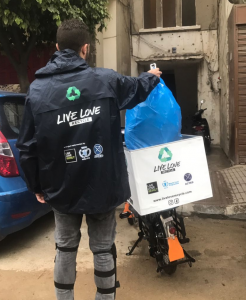Since 2015, Lebanon has struggled for solutions to its solid waste management woes. With piles of bin bags lining the streets of Beirut and the dumping of untreated garbage straight into the sea threatening public health and decimating tourism, civil society began looking for any means possible to mitigate the crisis. ACTED's contribution came in the form of the 'Live Love Recycle' initiative. Bassel, a refugee from Syria is a proud member of the initiative, working each day to help clean up Beirut.
Bassel's Story
 Bassel, a 21-year-old refugee from Hama, Syria, first came to Lebanon in 2009 with his parents and five sisters. With his elderly father no longer able to work, Bassel dropped out of school at 14 and took on the role of breadwinner for the family.
Bassel, a 21-year-old refugee from Hama, Syria, first came to Lebanon in 2009 with his parents and five sisters. With his elderly father no longer able to work, Bassel dropped out of school at 14 and took on the role of breadwinner for the family.
In 2018, Bassel was among the first people to join the ‘Live Love Recycle’ project, which aims to use social media and technology to transform the way Lebanese households approach recycling. This initiative, which utilizes the “Live Love Recycle” mobile phone application, also provides employment opportunities for marginalized young men in recyclable collection from households and businesses using environmentally-friendly electric bikes and Tuc-Tucs.
I felt like I was doing something new. I was also happy to play a role in trying to resolve the garbage crisis in Lebanon
The roots of Lebanon’s rubbish crisis lie in the decision to close the Naameh landfill site in southern Beirut in 2015. As this was the largest refuse site in the country and no alternative sites were identified, rubbish collection ceased and hundreds of tons of waste piled up in the streets of Beirut and elsewhere. Three years later, the authorities are still struggling to find viable solutions.
Since the beginning of the project, Bassel was intrigued by this new sector: “It was the first time I worked in recycling, and I really liked it,” said Bassel. “I felt like I was doing something new. I was also happy to play a role in trying to resolve the garbage crisis in Lebanon, ” he added.
Bassel excelled at the trainings provided by ACTED, which included topics such as customer relations and technology. For Bassel, like most people, getting a ‘behind the scenes’ view of how our household waste is recycled using modern technologies proved fascinating. Bassel went on to represent Live, Love, Recycle at promotional events, including a farmers market held in Badaro, Beirut, as well as Beirut Design Week. Due to the success of the project on social media, Bassel was interviewed by many international media outlets, including Reuters and Le Monde.
According to Human Rights Watch there are more than 941 open dumps across Lebanon, including 617 municipal waste dumps, more than 150 of which are being burned on a weekly basis. Open burning poses serious health risks including heart disease, cancer, skin diseases, asthma, and respiratory illnesses.
Bassel was happy to find work that allowed him to develop his skills in a field with growing significance in the face of today’s environmental challenges, and now after the WFP program, he has been hired full time by Live, Love, Recycle. Outside of work, he is currently raising awareness on the importance of recycling in his area of residence in Beirut, as well as recycling in his own home. Bassel is also looking at the larger picture, where he is striving to undertake a recycling initiative in his hometown of Hama, Syria, after the conflict comes to an end.

Live Love Recycle was implemented by ACTED Lebanon and Live Love Lebanon with funding from the World Food Programme.